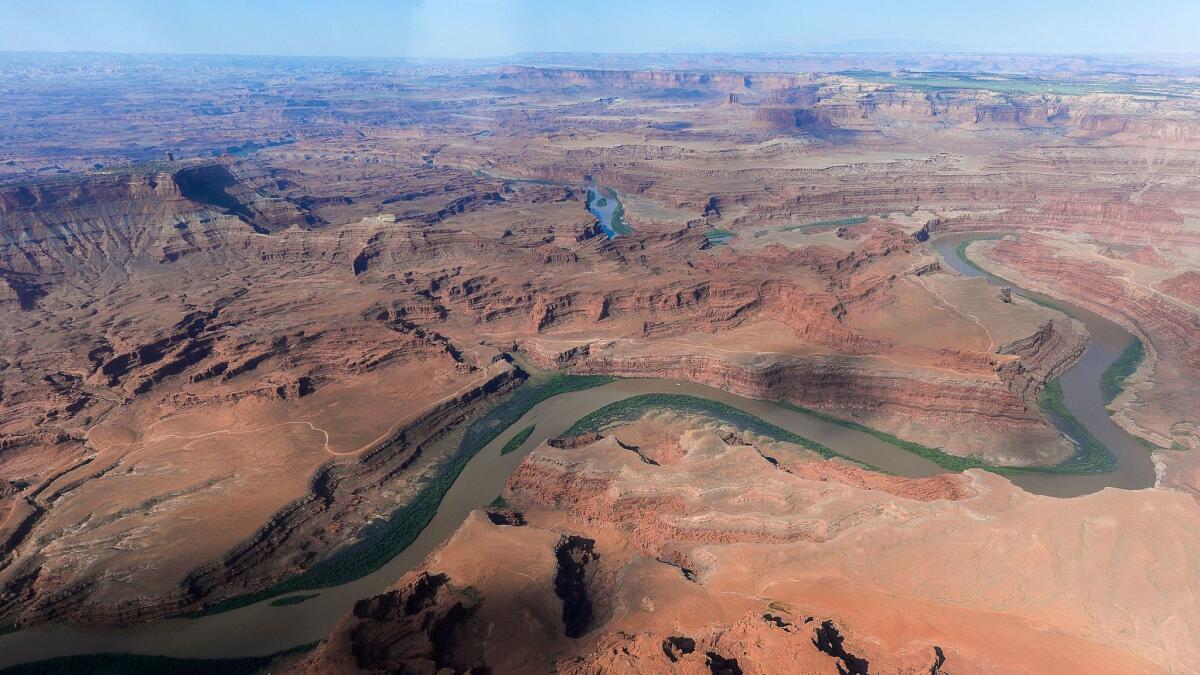Opinion: Trump is doing the public no favors by reviewing newly designated national monuments

- Share via
To the editor: I’m a scientist and not a lawyer, so I won’t argue the legal claims made by attorneys from a conservative think tank. But the real “magical thinking” is to believe President Trump’s claims that he’s acting in the public interest by opening up dozens of national monuments for “review.” (“It’s magical legal thinking to say Trump can’t reverse Obama’s national monuments,” Opinion, July 6)
Nothing could be further from the truth. This is a blatant attempt to industrialize these magnificent places, with the oil, gas, private water and logging industries as the beneficiaries.
The public is not calling for clear cutting in Giant Sequoia National Monument. It has not asked for drilling or fracking in Carrizo Plain or pumping groundwater from underneath Mojave Trails. National monuments in California and other states enjoy devoted, widespread local support.
Ileene Anderson, Los Angeles
The writer is public lands director and senior scientist at the Center for Biological Diversity.
..
To the editor: Lawyers Todd Gaziano and John Yoo, authors of an American Enterprise Institute paper on monuments law, argue that it is wishful thinking to believe that Trump cannot revoke or reduce national monuments designated by earlier presidents. They fundamentally misunderstand the nature of federal authority over the public lands.
The Property Clause of the Constitution vests all authority over federal property in Congress. In the Antiquities Act of 1906, Congress delegated some of that authority — power to protect objects of historic or scientific interest, including landscapes such as the Grand Canyon — to the president.
Unlike other statutes passed around the same time, Congress did not give any president the power to revoke or modify designations of presidents who came before. Under the Constitution, it is for Congress, not Trump, to correct any unwise exercise of the power to create national monuments by earlier presidents.
Are there enough votes in Congress to revoke these important contributions to America’s conservation estate? That is the question.
Bret C. Birdsong, Las Vegas
The writer is a professor at the University of Nevada, Las Vegas School of Law, where he focuses on environmental law.
..
To the editor: It is not surprising that the American Enterprise Institute looks with favor on allowing reconsideration by the current administration of national monuments established by past administrations, nor is it surprising that some of the monuments in western states have encountered opposition.
Even though most national parks and monuments prove to be boons to local economies, there will always be people who would deprive future generations the benefits of these pristine areas to take advantage of short-term profits.
Yet history says it all: Without national parks and national monuments, we would have no groves of coast redwoods or giant sequoias; we would have a reservoir in the Grand Canyon (as we do in the Hetch Hetchy Valley, north of Yosemite Valley); and we would have “development” where there never should be.
Our national parks and monuments are indeed the best ideas the country ever had. We should all hope that Trump’s “reconsideration” will lead nowhere.
Paul Cooley, Culver City
Follow the Opinion section on Twitter @latimesopinion and Facebook
More to Read
A cure for the common opinion
Get thought-provoking perspectives with our weekly newsletter.
You may occasionally receive promotional content from the Los Angeles Times.






